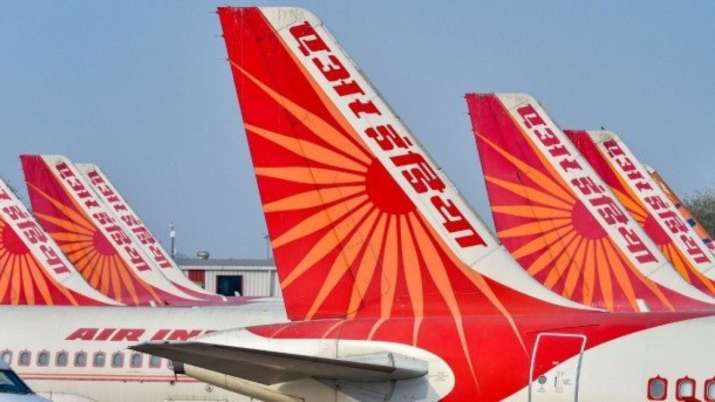Govt signs share purchase agreement with Tata Sons for Rs 18,000 crore Air India sale

Tatas would not get to retain non-core assets such as the Vasant Vihar housing colony of Air India, Air India Building at Nariman Point, Mumbai, and Air India Building in New Delhi.
The government on Monday signed the share purchase agreement with Tata Sons for the sale of national carrier Air India for Rs 18,000 crore.
Earlier this month, the government had accepted an offer by Talace Pvt Ltd, a unit of the holding company of the salt-to-software conglomerate, to pay Rs 2,700 crore cash and take over Rs 15,300 crore of the airline’s debt.
Following that, on October 11 a Letter of Intenet (LoI) was issued to the Tata Group confirming the government’s willingness to sell its 100 percent stake in the airline.
“Share Purchase Agreement signed today by Government with Tata Sons for strategic disinvestment of Air India,” Department of Investment and Public Asset Management (DIPAM) Secretary Tuhin Kanta Pandey tweeted.
Air India Director – Finance Vinod Hejmadi, Civil Aviation Ministry Joint Secretary Satyendra Mishra, and Supraprakash Mukhopadhyay from the Tata Group signed the share purchase agreement (SPA).
Now, various regulatory clearances, including from the Competition Commission of India (CCI), would have to be taken by Tata Sons before the actual handover of the airline takes place by December end.
The government is divesting its 100 percent ownership of Air India and Air India Express along with its 50 percent stake in ground-handling company AISATS.
Tatas beat the Rs 15,100-crore offer by a consortium led by SpiceJet promoter Ajay Singh and the reserve price of Rs 12,906 crore set by the government for the sale of the loss-making carrier.
As on August 31, Air India had a total debt of Rs 61,562 crore. As part of the deal, 75 percent of this debt, or Rs 46,262 crore will be transferred to a special purpose vehicle AIAHL before handing over the loss-making airline to the Tata Group.
Tatas would not get to retain non-core assets such as the Vasant Vihar housing colony of Air India, Air India Building at Nariman Point, Mumbai, and Air India Building in New Delhi.
Of the 141 Air India aircraft that Tatas would get, 42 are leased planes while the remaining 99 are owned.
Tatas will also take over the capitalized lease liability on account of operating leases of Rs 9,185 crore. Besides, some of these 141 planes are grounded due to maintenance issues. Also, there is an obsolescence factor as many of these aircraft are not fuel-efficient.
The government will, however, transfer about Rs 16,000 crore of unpaid current liabilities, in excess of current and non-current assets, such as fuel bills and other pending dues that Air India owes to suppliers, to Air India Assets Holding Ltd (AIAHL).
While this will be the first privatization since 2003-04, Air India will be the third airline brand in the Tatas’ stable — it holds a majority interest in AirAsia India and Vistara, a joint venture with Singapore Airlines Ltd.
Air India will give it access to a fleet of 117 wide-body and narrow-body aircraft and Air India Express Ltd another 24 narrow-body aircraft, besides control of 4,400 domestic and 1,800 international landing and parking slots at domestic airports, as well as 900 slots at airports overseas such as London’s Heathrow.
Air India started suffering losses every year since its merger with Indian Airlines in 2007-08. A Turnaround Plan (TAP), as well as a Financial Restructuring Plan (FRP), were approved for Air India by the previous UPA regime in 2012.
However, the TAP did not work out and Air India continued to reel under losses, with the government giving Rs 20 crore/day to keep the airline afloat.
Over the last decade, more than Rs 1.10 lakh crore was infused by way of cash support and loan guarantees in the loss-making airline to keep it afloat.
“Right now Air India is having losses of Rs 20 crore/day. So those losses after handover will not come to the taxpayers. The question is that when you have excessive debt and your equity value is deeply negative at (-)Rs 32,000 crore…”
“So unless and until you reconstruct the balance sheet, the only option would have been to actually close down the company. Because there was no other option to run this kind of a company,” Pandey had earlier said.
ALSO READ | Decision on Air India will give new energy to aviation sector: PM Modi
ALSO READ | Procurement of expensive aircraft parts to be done after approval of senior official: Air India
Latest Business News
For all the latest Business News Click Here
For the latest news and updates, follow us on Google News.

